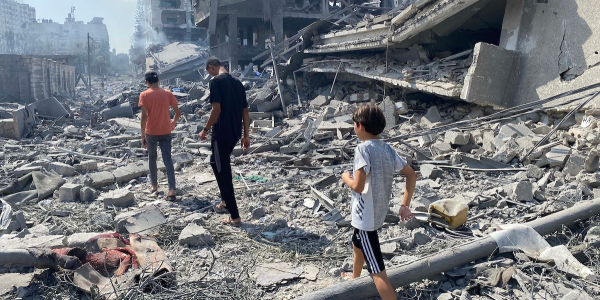‘Archive Transformed’ residency at CU Boulder will pair scholars with artists
David Shneer is hoping to arrange a half-dozen hookups on the University of Colorado Boulder campus next year — in a way that’s never been done before. And, no, not that kind of hookup; he wants to facilitate collaboration between scholars and artists.
The goal is to boost scholars’ creativity and to boost artists’ depth.
Shneer, the Louis P. Singer chair of Jewish history and department chair of religious studies, recently launched “Archive Transformed,” a scholar-artist collaborative residency that will take place May 13-18, 2018, at the historic Colorado Chautauqua in Boulder.

David Shneer, shown here teaching a history class, hopes to encourage collaborations between artists and scholars. CU Boulder photo by Casey A. Cass
“There is clearly a hunger for scholars to work with artists, who are thinking about how to be more creative. And the same is true from the artists’ perspective, who are looking for more depth” he says.
Shneer defines an archive as any body of knowledge — physical, digital, documentary — that can be mined by scholars to produce new knowledge. The new residency is intended to bring scholars and artists together to present that new knowledge in creative ways.
Scholars and artists apply together for the all-expenses-paid residency. A committee will then choose six pairs to spend five intensive days together at Chautauqua, working on bringing archival material to life through collaboration. The residency will conclude with a public presentation of the first results of the collaborations.
“The residency is wide-ranging and could bring together anyone from a neuroscientist interpreting fMRIs with a painter who visualizes the brain, to a historian investigating slave-trading routes and a musician working with music that reflects the slave experience,” he says.
“These collaborations will take archival material and transform it for the 21st century in some innovative way, whether musical, filmic, dance, visual, digital, or other modes of presentation not yet imagined.”
“The ‘Archive Transformed’ residency is a truly interdisciplinary project that seeks to merge interrogations and celebrations of historic archives with lived and embedded scholarship, thus lending a steady pulse to the past,” says Erika Randall, chair of the CU Boulder Department of Theatre and Dance and a member of the advisory committee for the residency.
Shneer and the members of the advisory and selection committee believe this is the first residency of its kind. It is being funded by the University Libraries, Special Collections and Archives at CU Boulder, the CU Art Museum, Center for Humanities and the Arts, Center for Western Civilization, Thought, and Policy, as well as the Louis P. Singer Fund for Jewish History and several departments.
When we have been doing performances around the country, people come up to me, scholars, and say, ‘I want to do what you are doing, how can I find an artist?’”
The story that inspired Shneer to come up with the idea is remarkable in its own right.
In Berlin, Germany, in 2008, he shared a Shabbat dinner with Jalda Rebling, daughter of Dutch Jewish cabaret singer and Holocaust survivor Lin Jaldati. When he asked Rebling, a lesbian cantor ordained by the Jewish Renewal movement, based in Boulder, how she came to be a cantor, she replied, “I was a star of East German Yiddish theater.”
“I’m a scholar of East European Jewish history, and I’d never even knew there was such a theater,” Shneer recalls. Intrigued, he pressed for more details, and she “went on an hour-long monologue and told her mother’s entire life story.”
Rebling said that her mother and aunt had been the ones to break the terrible news of Holocaust victim Anne Frank’s death from typhus at the Bergen-Belsen concentration camp in 1945 to her father, Otto. Shneer says, Jaldati “was arguably the last person to see Anne Frank alive.”
To confirm the incredible story, he traveled to the archives at the Anne Frank Museum in Amsterdam.
“Not only was there truth to the story,” he says, “but I knew this was going to be my next project.”
In 2015, he published a German-language biography of Jaldati for popular audiences. But the material so inspired him that he wanted to do something more.
“I didn’t want the same old narrative,” Shneer says. “I needed help with how I could take her story and do something different than just writing a traditional scholarly monograph.”
So he called a friend, San Francisco-based artist and performer Jewlia Eisenberg, initially thinking she would bring her musical talents to the project.
The result of their collaboration, Art is My Weapon, is a 70-minute, TED-style performance that tells Jaldati’s remarkable life story through words, images and songs performed by both. The pair first performed a pilot version for the Association for Jewish Studies conference in 2015, and has now presented a more refined version in Philadelphia and Toronto, with performances in Los Angeles and New York scheduled.
Art is My Weapon will open the Archive Transformed residency on Sunday, May 13, 2018.
“That project has served as a model of collaboration for people who think about what an artist-scholar collaboration can look like,” Shneer says. “When we have been doing performances around the country, people come up to me, scholars, and say, ‘I want to do what you are doing, how can I find an artist?’”
He hopes the residency will also serve as “a kind of matchmaking service for scholars looking for artists and artists looking for scholars, who ideally can be paired with people at CU. Anybody can apply, and we’re hoping that working with a CU collaborator will really make our faculty and staff shine.”
Anyone may apply for the “Archive Transformed” residency, including freelance artists and scholars. The call for proposals can be found at www.colorado.edu/rlst. The deadline for application is Dec. 15. For more information about how to apply, email archivetransformed@colorado.edu.



